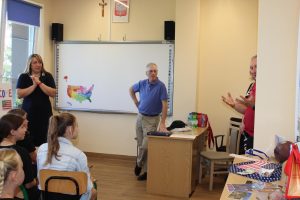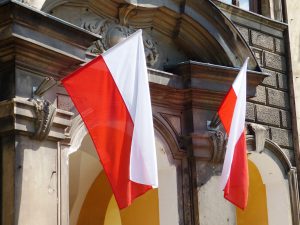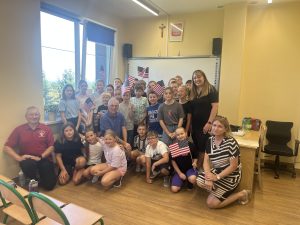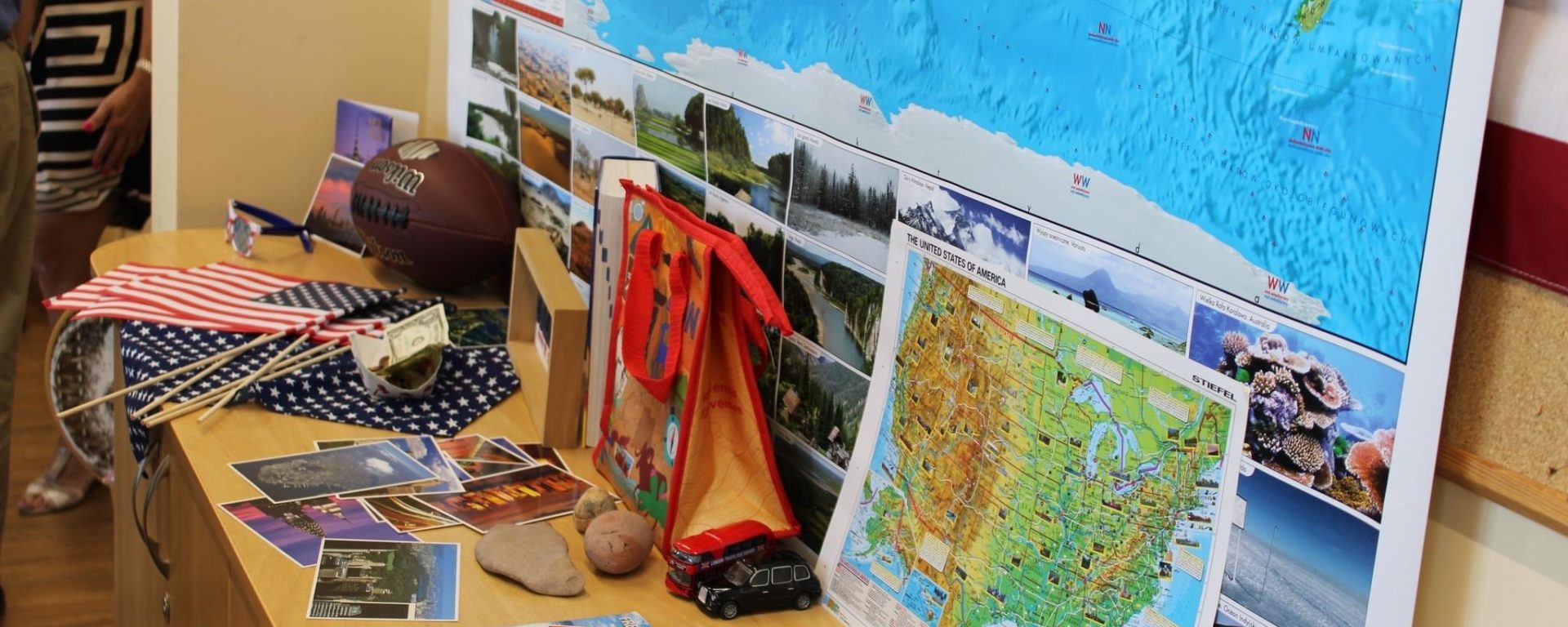By: Lisa Wiśniewski and Dr. John Kania
This summer, we had the incredible opportunity to travel to Poland — a visit that blended our shared passions for education, cultural exchange, and Universal Design for Learning (UDL). The experience was professionally enriching and deeply personal, sparking reflections on our work at Goodwin University and how we can connect more meaningfully with students and educators across the globe.
Sharing UDL beyond borders

Our trip began with an invitation to present at a conference in England, where we discussed Goodwin’s Community Conversations lecture series. This event opened doors to new opportunities, including an invitation to Krakow, Poland, to share our work on UDL with faculty and students at Ignatianum University. UDL, while well-known in the United States, is still relatively new in Poland. The Jesuit University’s vice-chancellor was eager to explore how this teaching framework could revolutionize their classrooms.
We also visited a primary school in the village of Jaroszowka and the National Academy of Applied Sciences in Jarosław. At each stop, we presented UDL in ways tailored to the audience, whether it was an introduction to the concept for university students or a more hands-on approach for elementary learners.
Engaging students across cultures

One of the most rewarding parts of our journey was engaging with diverse groups of students. In Jaroszowka, we worked with elementary students from grades 3 through 8, focusing on American culture and geography. For younger students, we highlighted the vastness of America, explored state maps, and discussed symbols like the U.S. flag. Older students asked thoughtful questions about American politics, homelessness, and social issues — a testament to their curiosity and eagerness to learn.
At Ignatianum University, we spoke with students who had transferred from various fields, including a former professional soccer player and a musician. They were enthusiastic about UDL’s potential to transform classrooms and communities. Their insights reinforced how universally applicable the UDL framework is, regardless of cultural or professional background.
A personal connection to Poland

For Lisa, this visit held profound personal significance. Having parents who emigrated from Poland during the Communist era, it was an honor to return to their homeland and share insights about America while learning more about modern Poland. The country’s remarkable growth since gaining democracy in the early 1990s is a powerful reminder of the resilience and potential within communities.
This trip also connected to the themes of Lisa’s upcoming book. Scheduled for publication on January 15, 2025, through Bloomsbury Publishing, “Navigating Education as a Forgotten Immigrant: Perspectives from the Eastern European Community” examines the immigrant experience, particularly for those from Eastern Europe. The visit highlighted both the historical reasons for migration and the evolving connections that allow today’s generation to maintain ties with their homelands.
Building bridges for the future
Our time in Poland inspired us to think deeply about expanding UDL’s reach. One of our goals since returning is translating the UDL framework into Polish to support ongoing collaborations. This work challenges us to adapt UDL with cultural sensitivity and clarity, ensuring its principles can be effectively implemented for international learners.
The visit also reaffirmed the importance of connecting students across borders. Whether it was teaching Polish elementary students how to throw an American football or discussing the theological aspirations of Jesuit university students, we were reminded of the universal hunger for learning and understanding.
The transformative power of cross-cultural connections

We are committed to building on the relationships we established in Poland. There is incredible potential for future collaborations, including implementing UDL at the university level and supporting English language learning initiatives in Polish schools. By sharing what we learned with our Goodwin students and colleagues, we hope to inspire more global connections and emphasize the transformative power of education.
This journey reminded us of the importance of creating meaningful, cross-cultural connections — whether through education, shared stories, or frameworks like UDL. Together, we can foster educational excellence, empower learners, and create a more connected world.
Dr. Lisa Wiśniewski
Dr. Lisa Wisniewski is Professor of Sociology at Goodwin University. Her research has focused on immigrant students, the scholarship of teaching and learning, and effective teaching practices focused on Universal Design for Learning.
Dr. Wisniewski presents regionally (New England), nationally, and internationally and has consulted on effective teaching practices (pedagogy, curriculum design, course design) at the higher education level. She is the current President of Faculty Senate at Goodwin University.
She also has several publications, podcasts, and blog posts featuring her work in teaching and advocacy. She is the host and producer of Community Conversations @ Goodwin University and Goodwin Teaches: Universal Design for Learning Stories in Higher Education.
Dr. John Kania
Dr. John Kania is a Professor of English and English as a Second Language (ESL) at Goodwin University in East Hartford, CT. He began his career in education at the primary level teaching all grade levels from preschool through graduate school. Dr. Kania is one of Goodwin University’s Universal Design for Learning (UDL) trained Teaching Fellows, and his primary areas of expertise are English, English as a Second Language (ESL), and Study Skills.
Dr. Kania has presented at regional conferences on UDL including the Learning Assistance Association of New England. (LAANE) and the Southern Regional Faculty and Instructional Development Consortium (SRFIDC) and the New England Educational Research Organization (NEERO). Nationally, Dr. Kania has presented on UDL at South by Southwest EDU and CAST’s Conference on Higher Education Pedagogy as well as presenting internationally at the International Research Symposium at Oxford University, England. He has also twice presented with Dr. Lisa Wisniewski at the World Educational Research Association (WERA) conferences in Spain and the UK.
At Goodwin University, we’re redefining higher education with hands-on, inclusive learning experiences rooted in the Universal Design for Learning framework. Ready to start your journey? Discover the Goodwin difference today!
Goodwin University is a nonprofit institution of higher education and is accredited by the New England Commission of Higher Education (NECHE), formerly known as the New England Association of Schools and Colleges (NEASC). Goodwin University was founded in 1999, with the goal of serving a diverse student population with career-focused degree programs that lead to strong employment outcomes.

